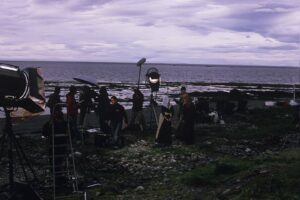Participants
This is not a lab for beginning writers. Each writer should have completed a screenplay or a feature/TV episode in order to be eligible.
Application Process
Participants will apply with scripts in development and 12 writers will be invited to the program.
Please note this is ONLY open to writers who have had experience writing a script before. The lab is not for first-time writers.
To participate in this program it is necessary to submit a project logline and synopsis, a script, and a writer bio.
DEADLINE FOR SUBMISSIONS: 15th March 2024 – at the end of the day.
Price: 40.000 Isk
Tina Gharavi
 Gharavi is a BAFTA and Sundance-nominated writer/director, focused on delivering authentic stories lensed with an impeccably wrought perspective. Having worked in war zones and guerrilla filmmaking, Gharavi marries her indomitable spirit with a distinct talent to deliver performances and beautifully observed stories. Her debut feature, I Am Nasrine, was nominated for a BAFTA and she is set to direct her third feature, a Virginia Woolf adaptation in 2024. Now a showrunner, Gharavi’s also engaged in development on her first TV series, Refurinn/The Fox, an Icelandic detective noir with an intriguing twist, exec produced by Nomadic Pictures (Fargo). She recently completed directing her first Netflix series, 4 episodes shot in Morocco: a hybrid drama-doc series, African Queens: The Cleopatra, for Westbrook, exec produced by Jada Pinckett-Smith.
Gharavi is a BAFTA and Sundance-nominated writer/director, focused on delivering authentic stories lensed with an impeccably wrought perspective. Having worked in war zones and guerrilla filmmaking, Gharavi marries her indomitable spirit with a distinct talent to deliver performances and beautifully observed stories. Her debut feature, I Am Nasrine, was nominated for a BAFTA and she is set to direct her third feature, a Virginia Woolf adaptation in 2024. Now a showrunner, Gharavi’s also engaged in development on her first TV series, Refurinn/The Fox, an Icelandic detective noir with an intriguing twist, exec produced by Nomadic Pictures (Fargo). She recently completed directing her first Netflix series, 4 episodes shot in Morocco: a hybrid drama-doc series, African Queens: The Cleopatra, for Westbrook, exec produced by Jada Pinckett-Smith.
Gharavi is also an academic, teaching filmmaking around the world, and was awarded an MIT Fellowship. She was elected into the BAFTA Academy in 2017, is represented by Independent Talent in the UK and Gersh in Los Angeles, her two home bases.
LAB WORKSHOP PLAN : SCHEDULE & OUTLINE
DAY ONE: Foundations of Storytelling
Morning Session:
- Welcome and Introduction: Establish a warm and collaborative atmosphere, and introduce the workshop’s objectives.
- Keynote Address: The importance of continuous development and refinement in scriptwriting.
- Script Analysis: Participants share synopses of their existing screenplays, followed by group discussions and feedback on each project’s strengths and areas for improvement.Afternoon Session:
- Character Deep Dive: Examine the characters in participants’ scripts, focusing on their motivations, arcs, and relationships with one another.
- Theme Exploration: Discuss the central themes of each screenplay and brainstorm ways to amplify and deepen their impact.
- Group Exercise: Participants break into small groups to identify key structural elements in their scripts and discuss potential revisions.
DAY TWO: Developing and Enhancing Your Script
Morning Session:
- Plot Refinement: Provide guidance on strengthening the plot of each screenplay, including pacing, conflict escalation, and narrative twists.
- Dialogue Workshop: Participants workshop scenes from their scripts, focusing on crafting authentic, engaging dialogue that reveals character and advances the story.
- Genre and Tone Assessment: Analyze the genre and tone of each screenplay, exploring ways to enhance their effectiveness and appeal to target audiences.Afternoon Session:
- One-on-One Feedback Sessions: Participants receive individualized feedback focusing on areas such as character development, plot structure, and thematic resonance.
- Revision Strategies: Discuss effective strategies for revising and refining existing scripts, emphasizing the importance of iteration and feedback in the writing process.
- Pitch Preparation: Help participants develop concise and compelling pitches for their scripts, highlighting their unique strengths and marketability.
DAY THREE: Polishing and Pitching Your Script
Morning Session:
- Script Polishing: Participants work on implementing feedback and making final revisions to their scripts, focusing on tightening dialogue, clarifying character motivations, and strengthening thematic elements.
- Pitch Practice: Conduct mock pitch sessions, where participants present their scripts to the group and receive constructive feedback on their delivery, content, and overall pitch strategy.
- Industry Insights: Invite industry professionals to share insights on what they look for in a script and pitch, as well as strategies for navigating the industry and building relationships.Afternoon Session:
- Final Revisions: Participants incorporate feedback from pitch practice sessions and make final revisions to their scripts and pitch materials.
- Pitch Showcase: Each participant presents their refined script in a formal pitch showcase to a panel of industry professionals, followed by Q&A and feedback.
- Closing Remarks: Wrap up the workshop with reflections on the progress made and encourage participants to continue refining their scripts and pursuing opportunities in the industry. Encourage networking and relationship-building among participants and industry professionals to facilitate future collaborations and opportunities for script development and production.





